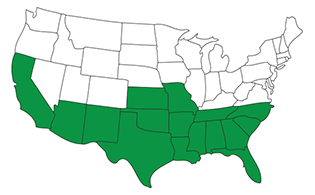
Bermudagrass Scale
Odonaspis ruthae
Scientifically known as Odonaspis ruthae, the Bermudagrass Scale is a tiny lawn insect that primarily affects Bermudagrass. This lawn pest can also be found attacking St. Augustinegrass, Centipedegrass, Bahiagrass and Tall Fescue. It prefers heavily thatched and shaded areas, and is typically found throughout much of the southern United States, and as far north as Missouri.
Identify

Leaf & Stem
These oval-shaped, flattened, pink lawn pests have short legs, antennae and spots on their eyes. Bermudagrass Scale are called crawlers during the nymph stage. Newly hatched crawlers settle and produce a waxy test, or shell, that is straw-yellow colored at first, and then eventually turns white. The shells of adult females are oval-shaped and male shells are about half the size of the females. The initial sign of Bermudagrass Scale damage is slow grass growth. Your grass will turn yellow, often resembling drought stress. Damage to your lawn is more evident during periods of hot, dry weather, though delayed spring green-up may also occur in areas where turf goes into winter dormancy.
Life Cycle
Little is known about the Bermudagrass Scale life cycle due to this lawn pest's small size. If conditions are right, an entire life cycle—from egg lay to full adulthood—can complete in 10 to 14 days. This rapid timeline helps explain how this lawn pest is able to quickly overrun and infest Bermudagrass lawns. Additionally, heavy infestations can yield populations so large at the nodes and crowns that the Bermudagrass Scales seem to be stacked on top of each other.

Control
There are two methods for controlling Bermudagrass Scale that TruGreen® recommends: 1. Use professionally applied pest control designed to prevent excess lawn pest populations, which can cause damage to your lawn 2. Kill insects, grubs and other lawn pests before they have a chance to damage your lawn Proper mowing and watering techniques can also help foster a healthy lawn that's more tolerant to lawn pest attacks—plus you'll get a lawn you'll want to live on in the process.







